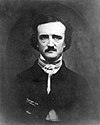Portal:Maryland/Selected biography/3

Edgar Allan Poe (January 19, 1809 – October 7, 1849) was an American poet, short story writer, editor, literary critic, and one of the leaders of the American Romantic Movement. Best known for his tales of mystery and the macabre, Poe was one of the early American practitioners of the short story and a progenitor of detective fiction and crime fiction. He is also credited with contributing to the emergent science fiction genre.
Born in Boston, Edgar Poe's parents died when he was still young and he was taken in by John and Frances Allan of Richmond, Virginia. Raised there and for a few years in England, Poe grew up in relative wealth, though he was never formally adopted by the Allans. After a short period at the University of Virginia and a brief attempt at a military career, Poe and the Allans parted ways. Poe's publishing career began humbly with an anonymous collection of poems called Tamerlane and Other Poems (1827), credited only "by a Bostonian." Poe moved to Baltimore to live with blood-relatives and switched his focus from poetry to prose. In July 1835, he became assistant editor of the Southern Literary Messenger in Richmond, where he helped increase subscriptions and began developing his own style of literary criticism. That year he also married Virginia Clemm, his 13-year old cousin.
After an unsuccessful novel The Narrative of Arthur Gordon Pym of Nantucket, Poe produced his first collection of short stories, Tales of the Grotesque and Arabesque in 1839. That year Poe became editor of Burton's Gentleman's Magazine and, later, Graham's Magazine in Philadelphia. It was in Philadelphia that many of his most well-known works would be published. In that city, Poe also planned on starting his own journal, The Penn (later renamed The Stylus), though it would never come to be. In February 1844, he moved to New York City and worked with the Broadway Journal, a magazine of which he would eventually become sole owner.
In January 1845, Poe published "The Raven" to instant success but, only two years later, his wife Virginia died of tuberculosis on January 30, 1847. Poe considered remarrying but never did. On October 7, 1849, Poe died at the age of 40 in Baltimore. The cause of his death is undetermined and has been attributed to alcohol, drugs, cholera, rabies, suicide (although likely to be mistaken with his suicide attempt in the previous year), tuberculosis, heart disease, brain congestion and other agents.
Poe's legacy includes a significant influence in literature in the United States and around the world as well as in specialized fields like cosmology and cryptography. Additionally, Poe and his works appear throughout popular culture in literature, music, films, television, video games, etc. Some of his homes are dedicated as museums today.
